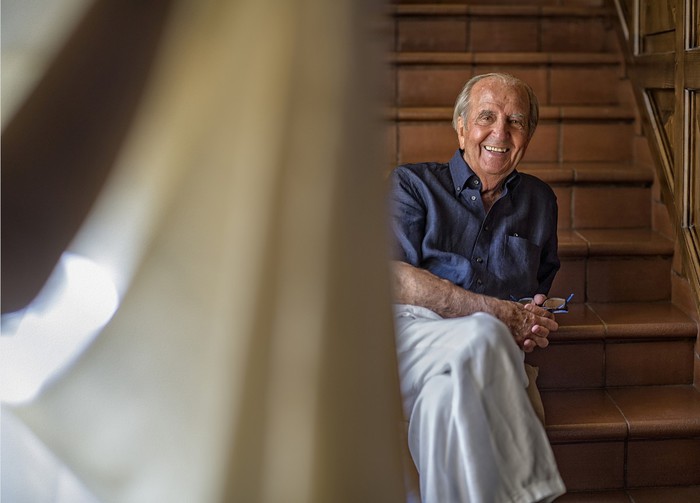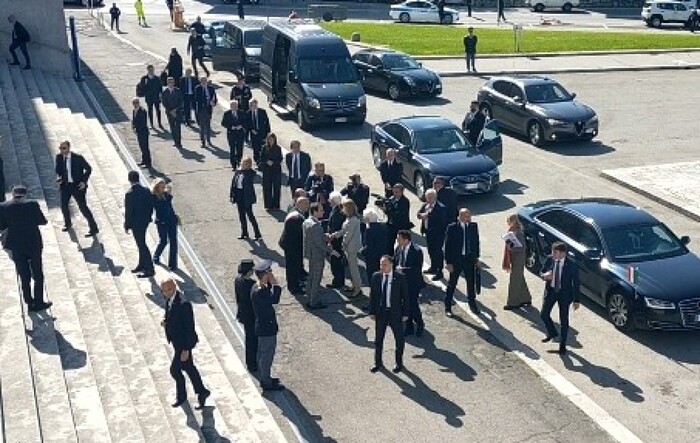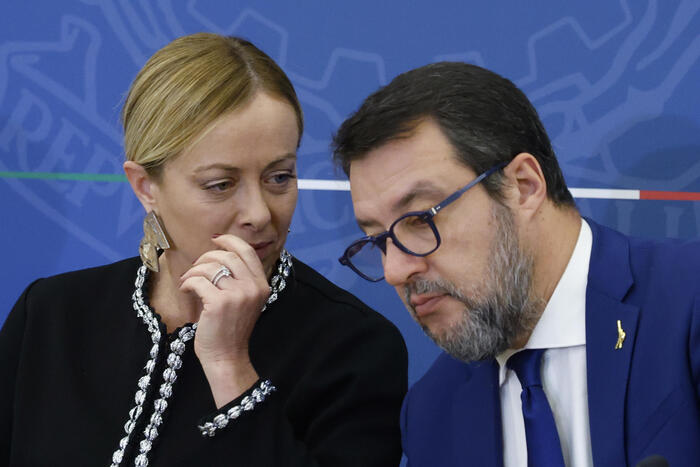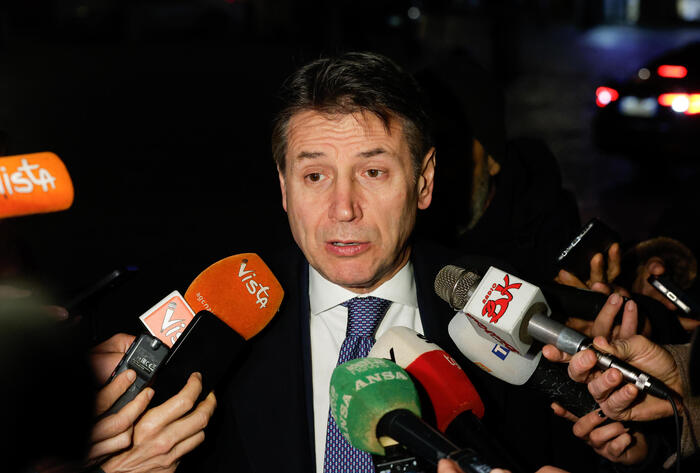The Government Center of Trieste is a splendid palace right on the Adriatic coast. Here, in the border area between Austria, Slovenia and the Italian city of Venice, ruled Massimiliano Fedriga. The 39-year-old became Prime Minister of the autonomous region of Friuli Venezia Giulia last year, one of the strongholds of the Lega.
Fedriga is known as an agitator. In spring, he triggered a controversial debate when he called for a wall or barriers on the border with EU neighbor Slovenia to keep migrants away. However, the Lega in the rich north of Italy is not just a protest party, but is closely linked to the local economy.
The regional election won Fedriga as a candidate for a center-right alliance with 57 percent. He has been working closely with Matteo Salvini for many years: After Salvini rose to become a Lega chief at the end of 2013, Fedriga became a fractional leader in the Italian Chamber of Deputies a few months later.
This Saturday, Salvini wants to protest against the new government with tens of thousands of fans in the largest square in Rome - in front of the Papal Basilica of San Giovanni in Laterano - under the slogan "The Pride of Italy". It is the largest gathering after a weeks-long campaign that led Salvini across the country.
Almost every day, he rallied at rallies against Prime Minister Giuseppe Conte and his Five-Star Movement and Democratic Party (PD) alliance. The Salvini confidante Fedriga considers a populist policy sensible. Read the whole interview here .
SPIEGEL: Why does the Lega set the mood with a big demo against the new coalition?
Fedriga: This government was born against the will of the citizens. People in Trieste stop me on the street and say: Send them home! There is huge dissatisfaction in the country. And when you create a government in a test tube, it will be difficult.
SPIEGEL: Why do you think the mood is so bad?
Fedriga: Last year, we started the five-star movement to change the country. And now the stars govern just the Social Democrats, who are responsible for many problems in Italy. This is considered by many as a betrayal.
SPIEGEL: Matteo Salvini is in the permanent election campaign, first as Minister of the Interior, now in opposition. How does this endless campaign criss-cross Italy?
Fedriga: I could not live the life of Matteo. He sleeps a little, is constantly on the move. After one day I would be completely exhausted. Salvini, like no one else, understands how people interpret their mood. He has the right intuition to find the most important topic and to give suitable answers.
SPIEGEL: His opponents accuse him of neglecting to work in parliament or, when he was still in government, in the ministry.
Fedriga: If you as a government no longer on the street, to the people, you are wrong. Then you make a policy in the seat of government that moves away from the people. You can call our attitude populism. I think a close connection between the people and the people's representatives is just sensible politics. The citizen must always be able to feel like a protagonist, even if we are in government.
SPIEGEL: Under Salvini, the Lega often looks like a one-man show.
Fedriga: We are now the oldest party in parliament. Salvini is not a lone fighter - he dictates the line, but we have a structure across the country. We are the only party that is represented everywhere in Italy, not just in social media. And we are not only a movement for sentiment, we also govern, with Prime Ministers in such important regions as Lombardy, the Veneto and here in Friuli-Venezia Giulia.
SPIEGEL: When Salvini demanded "all power" in the summer, many feared a seizure of power on the basis of a fascist model.
Fedriga: We want to win elections to govern for five years. I think this is a democratic and responsible message.
SPIEGEL: If it's that easy, what's the aggressive rhetoric about the Lega's many meetings?
Fedriga: When I speak in the piazza, I need a different register than at the university. I have limited time there, so I need to simplify our detailed concepts. But the political goal remains the same.
SPIEGEL: A prominent Lega slogan is "prima gli Italiani", which means: Italian first. Do not you think that's pretty nationalistic?
Fedriga: We have no endless resources. Who contributes to the common good through taxes, is also the first to the course. It's not about exclusivity, but about priority. It's like in a family: I bring nothing to eat the neighbors, if my own children have not got anything. Incidentally, here in Friuli we do the same. For example, we pay a contribution to the kindergarten fees - but only to parents who have lived here for at least five years.
SPIEGEL: What does that mean for migrants coming to Italy?
Fedriga: If illegal immigrants get a free accommodation, free tickets for local transport and even free hairdresser visits, that naturally leads to social tensions. It is clear that then citizens who have little to eat and can not pay a hairdresser visit, then upset.
SPIEGEL: Do not you fear that you will continue to split society with it?
Fedriga: It's not us who have intensified these tensions. These were former governments that increased inequality with their decisions.
SPIEGEL: Italy has largely isolated itself with Salvini's migration policy in Europe. No sooner had he left than Berlin, Paris, Rome and others agreed on a distribution of refugees arriving in Italy.
Fedriga: The distribution is not the biggest problem. Europe needs more and better agreements with the countries of origin to bring refugees back. Here in Friuli I tried to use microprojects to help returning migrants to found a company in their home country. Transferring large sums of money to the countries of origin does not help. We need to help individuals to find a future in their homeland for themselves and their families. Incidentally, I find that Europe is only trying to cleanse its conscience when it receives refugees from rescue ships. We should rather help to stabilize Africa economically.
SPIEGEL: What has become of your plan to build a wall against refugees on the border with Slovenia?
Fedriga: I talked about barriers. The Italian-Slovenian border is 250 kilometers long and runs through many forests. It is impossible to control everything. But barriers and radar in some places could help prevent the illegal entry of migrants.
SPIEGEL: Like Italy, Slovenia is a member of the EU and the Schengen area.
Fedriga: Of course, this is only possible in agreement with Slovenia and the Italian government. I can only make suggestions. But I am very worried. Since the change of power in Rome, there are again stronger incentives for illegal immigration, even on the eastern borders.
SPIEGEL: How would Salvini change the country if he eventually achieved his goal of becoming prime minister? Would there be an illiberal democracy in Italy, as established by Viktor Orbàn in Hungary? Would Rome turn away from Berlin, Brussels and Paris and orientate itself to the East?
Fedriga: Orbàn is an outstanding prime minister who has achieved a great deal for his country. If someone has won the majority and governs, that is not authoritarian. I also do not think that there is a big contradiction between Berlin, Paris and Budapest. Is there a government of the elites or the citizens - that's the big argument right now.














